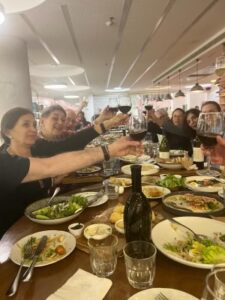
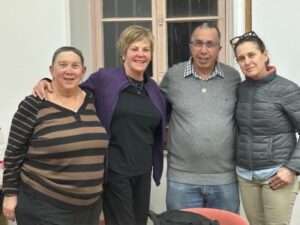
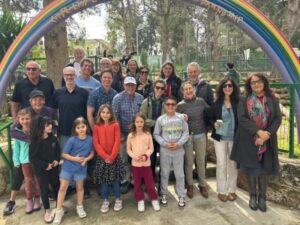
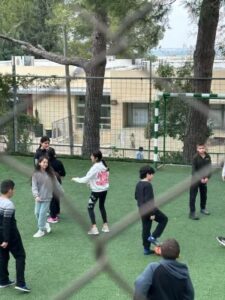
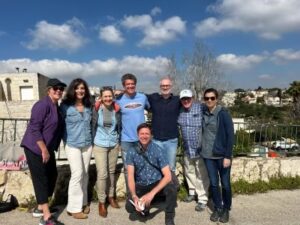
Hevre/Friends,
Our final day began with a breakfast briefing from Andi’s colleague, Andrea Arbel, the Executive Director of Sifriyat Pijama and Maktabat al-Fanoos (PJ Library in Hebrew and Arabic) of the Harold Grinspoon Foundation here in Israel. She gave us a riveting description of how they’ve been able to pivot after October 7 and throughout the war to provide literary and online resources to support Israeli Jewish families when they were sequestered at home and to those evacuated, as well as to Arab families with young children. They are creatively using the power of storytelling to build character, strengthen community, and promote the values of a just and peaceful society.
Our first stop on the bus was at Wahat al-Salam/Neve Shalom (“Oasis of Peace”), a village jointly run and shared by 70 Jewish and Arab families. We were the first foreign group to visit since the war broke out. As part of our solidarity work this week, it was important to visit those who are relentlessly committed to the work of building towards a shared, peaceful future. Surrounded by the bucolic landscape of the Ayalon Valley, for over 50 years the village has offered a model of coexistence informed by the values of mutual respect, equality and partnership. Their school and youth programs have inspired similar initiatives throughout the country. Seventy percent of young people raised in Wahat al-Salam/Neve Shalom apply to return as adults to raise their own families there. The current crisis has challenged the community to hold each other through the deep pain and suffering that families of each culture are experiencing, and also emboldened them to pursue their ideals even more vigorously. Our visit made peace seem all at once tantalizingly possible, somewhat idealistic, and still so deeply complex. We heard things we dream of hearing; we heard things that were hard to hear; we left without hearing some things we still long to hear. Still, it’s hard to describe the sweet sounds of boisterous Jewish and Arab children kicking a soccer ball around together during recess; just innocent children with their whole futures ahead of them. Will they finally live in peace and safety with each other, or will they simply become the next generation to inherit the conflicts that keep us apart? I can still hear their laughter in my ears, pulsating in my heart, echoing in my soul.
We were summoned from that utopia by a date with reality. My cousin, Captain Avigayil Bar Asher, is head of the Military Rabbinate’s Casualty Identification Team. Avigayil was visiting us in the Laurentians on the Shabbat of October 7 when she was awakened in the middle of the night by calls from her base alerting her to a mass casualty event for which she had to immediately start assembling teams to process what became an unimaginable number of bodies, many in unimaginably desecrated states. In her talk with us today, Avigayil explained as much as she could given the discretion required of her about how this sensitive and holy work is undertaken, especially under these intense circumstances. We learned about the rigorous identification procedures. Few knew that when a Jewish soldier (or in this massacre, a civilian) dies as a victim of an attack against the State, no tahara (ritual purification through washing) is required for the body because they are considered to have already attained a state of purity through their sacrifice. But Avigayil especially wanted us to understand how her team has worked with unparalleled professionalism and compassion to preserve the honor of the deceased and the dignity of their families. We were so moved by her strength, her integrity and her pride in being able to preserve our tradition’s deeply ingrained values under such trying circumstances. What an honor to have shared this time with her.
From there we made our way to Har Herzl, Israel’s military cemetery, where we paid our respects at the graves of recently buried soldiers lost to the war. Some had died as recently as two days ago. We saw the grave of the soldier who saved the twin babies I wrote about on Day 2, only to have been killed shortly thereafter. We also had the opportunity to fulfill the mitzvah of nichum avelim/comforting the mourners, as we encountered families of the fallen weeping over the graves of their loved ones. One gentle word of sympathy brought us into their circle of grief as they shared memories of their brothers, cousins and friends.
The last stop on our mission was to meet with Jacqui and Yaron Vital, the parents of Adi Kaploun who was murdered in her home on Kibbutz Holit near the Gaza border on October 7, shot dead in front of her 4-year-old son, Negev, and her 4-month-old son, Eshel. Her father, Yaron, was in a guesthouse nearby and was saved in part by Adi warning him to stay away as she heard the terrorists approaching. Yaron described to us the harrowing events of that day which included the two little boys – who were both badly injured – being taken to the Gaza border and then suddenly released with a neighbor. Jacqui, Adi’s mother, was born and raised in Ottawa and was especially eager to meet with our group (and see her cousin Andrea who is traveling with us). She ended our time together by reminding us that the story we heard from them, and all the stories we’ve heard over these past four days, now belong to us as well. They are now ours to tell the world, especially those who would dare deny or diminish them. We walked into the room as visitors; we left as ambassadors – with clarity and purpose in tow.
It was time to eat. Again. While that might seem odd, the truth is that even our lowest lows here have been buoyed by our people’s insatiable appetite for life, for laughter, and for love. And so we feasted one last time together at Shalva, a remarkable center for people with disabilities and their families that offers cutting-edge therapy, education, recreation, and employment training. Their fabulous restaurant which employs some of their clients is a model of inclusion whose profits help fund their programs. After a delicious dinner, we sang, we shared reflections on the trip, and we named what we were taking away with us and what we were leaving behind. We reminded ourselves that we can hold many different feelings and values at once without losing coherence or conviction: that we can affirm the justness of our battle to eradicate Hamas even as we worry for injured Gazan children and other innocents caught in the crosshairs of war; that we can pray for the release of the hostages even as we wrestle with the demands made of us in return; that we can be moved by the efforts at coexistence even as we remain with so many questions unresolved. We prayed for safe travels home and for the strength to keep fighting our own battles in the US and Canada against vicious and unabating antisemitism, we cried, we hugged, and we sang some more – an invigorating niggun and a song of peace. Then we said goodbye to one another and to this place we will always call home, and made plans to return as soon as we can.
Shabbat Shalom,
Dini